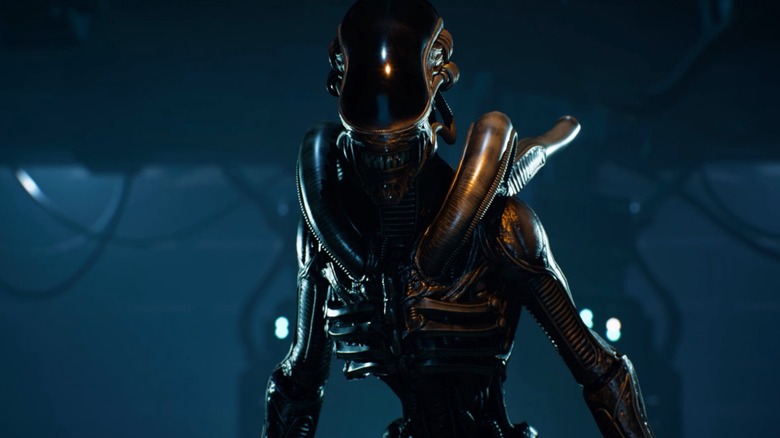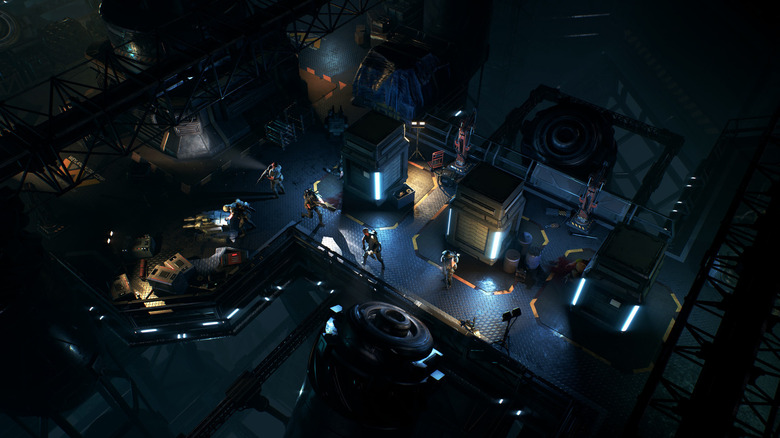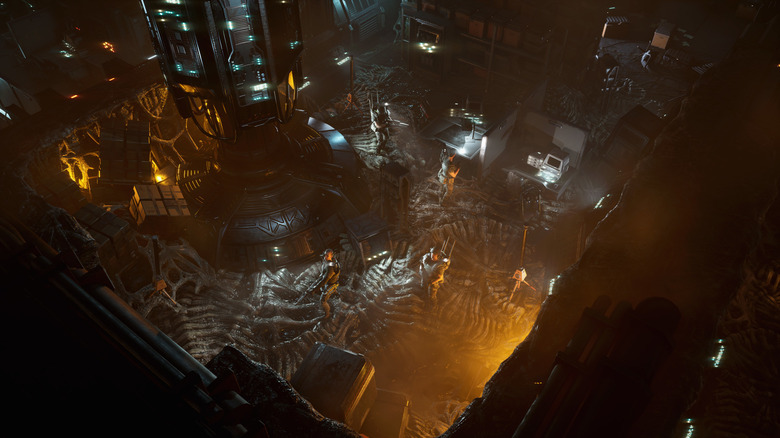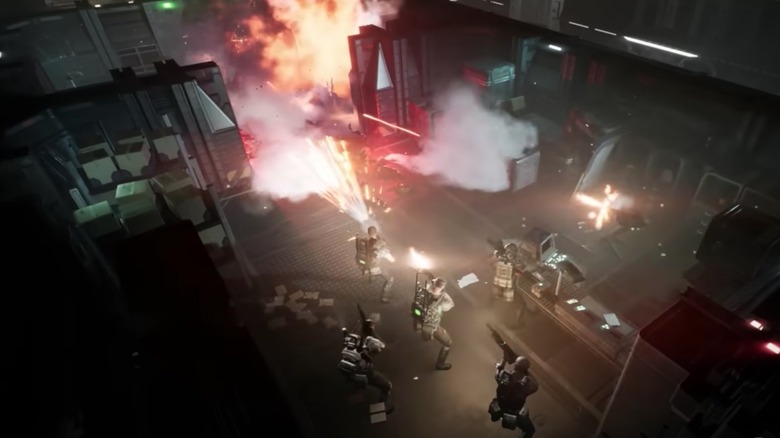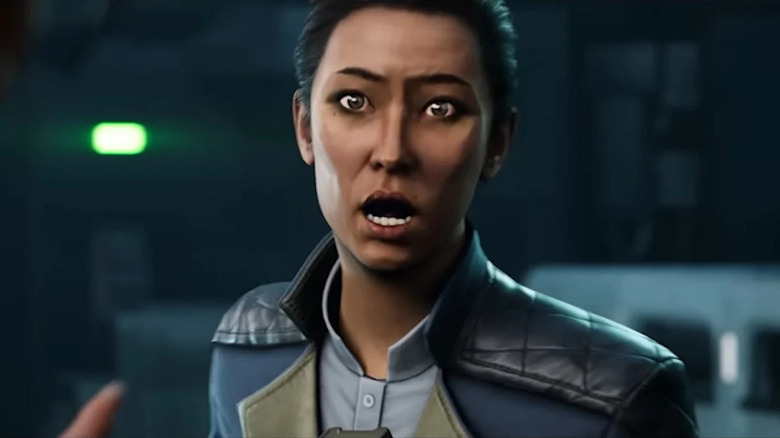Aliens: Dark Descent Review - Nobody Will Hear You Scream
- Does a great job of capturing the feel and tone of the franchise
- Fun and deep strategic gameplay
- A lot of tension during missions
- In-depth options allows players to tailor their experience to match preferences
- Story adds little to the experience
- Some graphical bugs disrupt the experience
An Xbox Series X review code for "Aliens: Dark Descent" was provided to SVG for this review. The game is available now on PS4, PS5, Xbox One, Xbox Series X|S, and PC.
The "Alien" franchise has had a lengthy relationship with the video game industry. Its first video game tie-in was just called "Alien" and was released in 1982 for the Atari 2600. The franchise's releases have enjoyed the highs of titles like "Alien: Isolation" and its terrifying AI for the Xenomorph players face off against throughout the game, but has also suffered lows like the disappointing "Aliens: Colonial Marines."
The most recent video game outing for the franchise comes in the form of "Aliens: Dark Descent," a squad-based single player real-time strategy game. It puts you in charge of the crew of a crashed ship filled with marines, doctors, and scientists as it tries to escape the planet Lethe that has become infested with Xenomorphs. To do so, you have to make repairs to their ship, manufacture new gear, save as many survivors as possible, and lead teams of marines on tense, high-stakes missions. It manages to balance all of its elements so well that it is a treat for "Aliens" and strategy game players alike.
A new approach to Alien
Despite the dozens of video game titles the "Alien" franchise has supported, there has never quite been an "Alien" game like "Dark Descent." Blending the squad management mechanics of "X-COM" with the real-time combat of RPG titles like "Pillars of Eternity," it charts new, horrifying ground for the franchise.
When not on a mission, you are able to access different parts of your crashed ship, the USS Otago. There, you are able to spend resources to train soldiers, repair facilities, build new equipment, and prepare for your next mission. While this pillar "Dark Descent" doesn't boast the depth or variety of games like "X-COM 2," it does an admirable job of putting the power in your hands to approach playthroughs in your own way. It also provides a break in the tense methodical pacing of missions by giving you time to breathe and take their time without the impending stress of a Xenomorph attack.
During missions, you control a squad of four marines as a unit in real-time strategy sequences. Rather than individually moving units around the map, you give commands to the squad and the game handles assigning each task to a particular soldier. This style of gameplay can take some getting used to, but once it sinks in a bit it allows you to control your squad without getting caught up in the minutiae of making sure the best character is always selected for each action.
Tension, Horror, and Strategy
Embarking on missions is where "Dark Descent" really thrives. This is because of how its approach to player control and strategy lends itself to creating tension-filled missions that force you to be careful and methodical. It can be a very punishing game, especially when playing with the optional setting that restricts you to only using two autosaves for an entire playthrough.
Throughout each mission, you have to consider and balance the condition of your marines, their supplies, the equipment and skills at their disposal, and the Xenomorph's aggression levels. There is a ton going on at any given moment during missions, and the inability to pause the game adds even more pressure on you to make decisions as quickly and efficiently as possible. Thankfully, "Dark Descent" has an extended tutorial sequence that does an excellent job of filling you in on every detail you have to manage while also including numerous gameplay options to tweak gameplay to your preferences.
What really stands out about missions in "Dark Descent," however, is their tone. First and foremost, it is a survival horror game. Good planning and resource management can put you in a position of power while fending off a horde of attacking Xenomorphs, giving the you a rush of dopamine for a job well done. But these moments tend to be fleeting as danger lurks around every corner and it is easy to be caught off guard.
Maintaining a sense of identity
Dedicated "Alien" fans will also be excited to hear that "Dark Descent" does an excellent job of capturing the tone and aesthetic elements of the series. The environments do this especially well, with moody lighting, claustrophobic corridors, threatening vents everywhere, and the chunky designs of old school science fiction. Everything looks and sounds just as it should. Computer screens glow green with chunky lettering, pulse rifles blend kinetic and electric feedback, and acid blood sizzles upon contact.
The pacing of "Dark Descent," both in cutscenes and gameplay, also match the franchise's iconic style. The introductory cutscene takes its time to build up suspense with nods to famous shots like a fragmented title card that appears in pieces and shots of massive space stations dwarfed by the celestial bodies they orbit. It does a pitch perfect job of setting the scene for the entire playthrough, and fans will feel right at home from the very first minutes of the game.
A story that is adequate but nothing new
Unfortunately, the weakest element of "Dark Descent" is its narrative that supports the framework for its gameplay. It calls back to elements from throughout the series, such as a strong female protagonist and the omnipresent looming shadow of corporate greed through the Weyland-Yutani Corporation. However, it struggles to build a story that remains compelling throughout an entire playthrough.
The story starts off strong enough and does a solid job of covering the basics of the Xenomorphs in a way that quickly catches up newcomers while not boring familiar fans. It resists dipping a toe in the expanded lore and mythology of the "Alien" universe that has been explored through films like "Alien: Covenant," and instead introduces its own elements that include a Xenomorph-worshipping cult, a corporate attempt to weaponize the lethal creatures, and numerous betrayals.
There are so many concepts at play that aren't fully explained, or their explanations are tucked away in text logs, that most players likely won't fully understand what is happening and will opt to check out of the story all together. Any player that wants a chance to really enjoy the story will have to put a lot of effort into following it, and even then they will be rewarded mostly through its interesting ideas rather than engaging characters or its storytelling itself if they can make it past the game's off-putting facial animations.
Ultimately, though, "Aliens: Dark Descent" packs a powerful punch that gives fans and newcomers something to love with this latest entry into the "Alien" catalog of video games.

